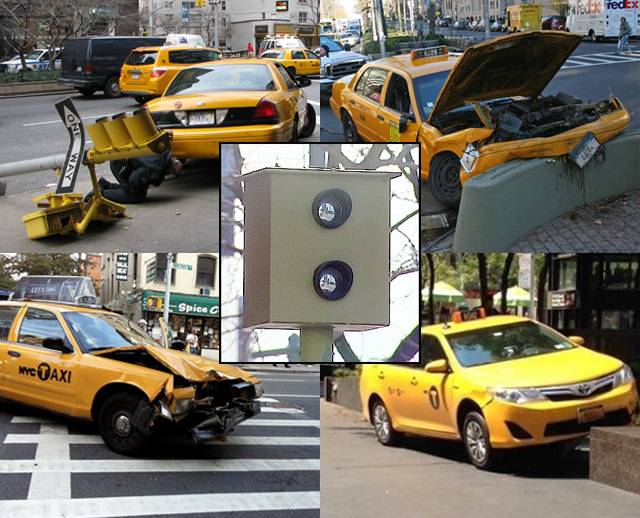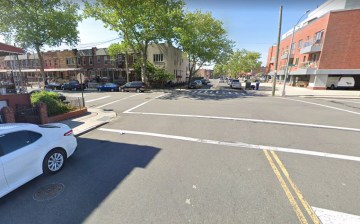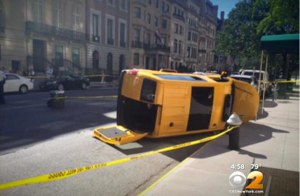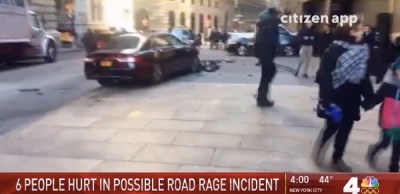City Not Using Camera Tickets to Crack Down on Reckless Cabbies

Straight to hell, cabbie — and step on it!
The Taxi and Limousine Commission does not suspend the license of cab drivers who are repeatedly caught on camera speeding — even though the rapidly expanding camera-based enforcement system issued close to 120,000 speeding tickets to cabs last year.
The TLC does suspend cab driver’s license if a cabbie accumulates a set number of points for running red lights or for being issued a speeding ticket by a cop. And the agency does monitor its drivers’ criminal records to make sure cabbies are good citizens.
But the agency, which is the main regulatory body to ensure that cab drivers operate their vehicles safely, claims it does not have the authority to take cabbies off the road for multiple camera-issued speeding tickets.
That’s a shame because cameras caught cabs speeding 117,042 times in 2019, up from 60,675 a year earlier, when there were fewer cameras. The number will only go up as the city installs 60 camera systems per month, up from 40 per month last year. The vast majority of those speeding tickets last year — 94,686 — went to livery, Uber, Lyft or other cars whose plates begin with “T.”
TLC officials have said that they don’t believe that the state laws permitting speed cameras allow the photos to be used for any other purposes, such as secondary enforcement from TLC, but that, of course, is open to interpretation. The law governing New York City’s speed camera program is actually state law — section 1180B of the vehicle and traffic law. The section, which authorized speed cameras as a “demonstration program,” specifically says that a camera-issued speeding ticket “shall not be made part of the operating record of the person upon whom such liability is imposed.”
Meaning: camera-issued speeding tickets can’t “count” against drivers because the camera — which spits out tickets to the owner of the car with the license plate it photographs as the car whooshes past it — would have no way of knowing whether the driver is the owner of said car, a friend or even a car thief.
As a result, the state DMV does not count camera tickets as “points” on a driver’s license. And the TLC has followed that interpretation of the law.
But it’s not the only one:
“TLC’s interpretation is a very narrow one [from] a somewhat cursory reading of the law,” said Marco Connor, co-deputy director of Transportation Alternatives.
Connor said that section 1180 was written simply to protect a driver’s privacy, not to bar the city from cracking down on speeders.
“The city’s use of footage in privacy matters is different from the city using such tickets, that are already paid or upheld in court, in support of other sanctions that are squarely within a specific agency’s traffic and passenger safety mandate,” Connor said.
So it would be illegal for the city to use a speed camera image as evidence in a different crime, but Connor says the TLC can certainly use a paid ticket as evidence of the crime of speeding.
And there is so much speeding going on in New York City that it’ll make your head spin (see embedded chart of all 2019 camera-issued speeding tickets to cab drivers).
Of the nearly 120,000 speeding tickets issued to taxis last year, many went to the same drivers. A casual glance of the city’s online database shows many of the same plates: Cars like T409375c (20 speed camera violations last year), T417584c and T405067C (eight speeding tickets last year), and T417584C (seven speeding tickets) should be of particular concern for the TLC. (If camera-issued tickets were subject to points on a DMV-issued driver’s license, only three tickets in 18 months would be enough to earn a license suspension. TLC rightly has an even lower threshold for driver suspensions — and does, indeed, discipline hundreds of drivers every year.)
Of course, many cabs have multiple drivers, so not every speeding ticket is being issued to the same rogue cabbie. But the TLC has the driver logs of every cab in town, and the agency could easily determine who was driving the cab when it was caught on camera endangering the public. (The agency did that, in fact, after a recent crash involving a cab that had been slapped with 14 camera-issued moving violations. The driver in the crash itself only had one speeding ticket on his record, the agency said).
Despite its aversion to camera-issued speeding tickets, the TLC certainly has no problem with another key type of camera violation: running red lights.
In 2018, the agency updated its policy and finally decided that red-light violations issued by cameras would be useful for deterring bad driving — and, as such, cabbies who run a red light get three points on their TLC license. Three red light tickets and you’re out.
The agency has in the past touted that update as a way to keep the public safe. The TLC had the support of such group as Families for Safe Streets and Transportation Alternatives in making enhanced use of the data to prevent dangerous behavior.
Alas, many members of the same community believe speed camera violations should also be considered.
“Six years ago today [Jan. 10], my son Cooper Stock was killed by a reckless taxi driver who plowed into him and my husband as they were crossing the street with the light,” said Dana Lerner of Families for Safe Streets. “Cooper would be 15-years-old now. I wonder every day what he’d look like, what he’d sound like and what he’d be doing now.
“TLC drivers should be held to a higher standard because they spend hours on our streets and need to be setting the standard bearers for a safe driving culture,” Lerner added. “Speeding kills more New Yorkers than drunk driving. It’s a silent killer that no one knows about until it happens to them. It’s horrific that the TLC continues to let known dangerous drivers operate a multi-ton weapon with impunity.”
Help may be on the way. State Senator Andrew Gounardes, who led the legislative fight to allow New York City install hundreds more camera systems, told Streetsblog that he’s on the case.
“It’s disappointing that the TLC is not using all the tools at its disposal to curb reckless drivers from being on the streets,” said the Bay Ridge lawmaker. “I will look into this and seek out a remedy.”
Connor suggested that the fix might be best made at the City Council level, which makes sense, given that the Council is currently finalizing a bill that would allow the city to seize cars that rack up multiple moving camera violations. Council Member Brad Lander said that unlike the TLC, he does not think the state law prevents the city from compiling a car’s camera violations and using them for additional punishment — in this case, the seizure of the car.
The Taxi and Limousine Commission declined to comment for this story.
Clarification: An earlier version of this story did not include camera tickets to green and yellow cab drivers. The numbers are now correct.
City & State NY is hosting a full day New York in Transit summit on Jan. 30 at the Museum of Jewish Heritage. This summit will bring together experts to assess the current state of New York’s transportation systems, break down recent legislative actions, and look towards the future of all things coming and going in New York. Join Keynote Speaker Polly Trottenberg, commissioner of the NYC Department of Transportation, along with agency leaders, elected officials, and advocates. Use the code STREETSBLOG for a 25-percent discount when you RSVP here!



